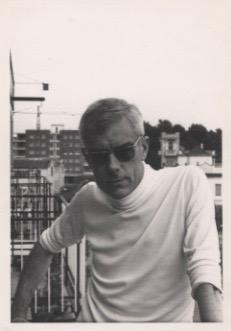2. Anglès
When war broke out, I was fourteen years
and two months old. In the beginning
it didn't affect me much. My head was full
of something else that even today
I consider more important. I discovered
Les Fleurs du Mal, and the meaning of that
was poetry, it is true, and yet
there's something else, but what to call it I don't know,
and that's what counts. Is it revolt? No.
That's what they called it then. Stretched out
in a hazelnut tree, in the heart of a rose
of drooping and very green leaves, like
flayed skin of a caterpillar, there, lying
in the crotch of the world, I thickened
with happy revolt, while the country
spat and crackled with revolt and counter-
revolt, whether happy I don't know, but
more in revolt than I was. Moral
life? It draws near but I think it's ambiguous.
The best term perhaps is self-centred
and it is better to remember that at fourteen
we must make the change from first person:
we are now in the grip of the plural and the exercise
of atop-the-column singular, the nausea
of one who has climbed above himself,
seems to us a good plan for the future.
Then come the years, and happily
they also move away and tiring us
is the hand that caresses the obstinate brow
of the intimate lamb, and so it is we adopt
this plural, whether from modesty I don’t know,
that gives up the singular, leaving it behind
but grateful to it, rewarding it. Enough.
When the holidays came to an end, yes,
I did see that someone had given
my world a new face. Blood and fire.
They did not seem awful to me, but were
the same blood and fire as always. My school
run by priests was burnt down and Guiu,
the sergeant who used to make us do
pre-military gymnastics, and whom we all hated
(I return to first-person plural because life
is always in regression), Guiu was
shot and killed and they told us
it hadn't been easy because he was wearing
a bullet-proof vest under his disguise
of old peasant woman in whose basket,
under the eggs, three grenades were hidden.
They killed him in the corner of Hercules
Square, next to the high school, just where
we used to come out between classes,
and I don't recall if the place seemed to us
marked in some way or if we wanted to find
in a plane tree trunk a bullet
or some other sign. As for blood,
naturally, perhaps that very day,
the wind blew it away. It made the dust
a little heavier maybe, but never mind.
The scorched walls of the primary school,
I don't know if I remember or just think I do.
We didn't go in. We did the move and
found no interest in the tatters
of old skin. We could smell the fear
that was the odour of that autumn,
but it seemed good to us. It was a fear
of grown-ups. We left the fear of childhood
and were lucky that the world made almost
everything easy for us. The more fear
they had, the freer we children felt.
(From Da nuces pueris, 1960)
* * *
BEDROOM IN AUTUMN
The slatted wooden blind, not fully closed, like
a fright that holds itself back from falling to earth,
does not separate us from the air. Look, straight
and thin, thirty-seven horizons are opening,
but the heart forgets them. Without yearning
the light is dying on us, once the colour
of honey and now the colour of apple smell.
How slow the world, how slow the world, how slow
the sorrow for the hours that run away
so fast. Tell me, will you remember
this room?
I like it a lot.
Those workers’ voices … What are they?
Builders:
a house is missing in the block.
They sing,
and today I don’t hear them. They shout, laugh,
and today when they’re quiet sounds strange.
How slow
the red leaves of voices, how uncertain
when they come to tuck us in. Now asleep
the leaves of my kisses are tucking in
the havens of your body, and while you forget
the high leaves of summer, the open
days without kisses, right in its depths
the body remembers: still
your skin is half sun, half moon.
(From Menja't una cama (Eat a Leg), 1962)
* * *
AT LEISURE
She sleeps. The hour that men
are already awake, and little light
has entered yet to wound them.
With very little we have enough. Only
the feeling of two things:
the earth goes around and women sleep.
Reconciled, we make our way
towards the end of the world. We need
do nothing to help it.
(From Teoria dels cossos (Theory of Bodies), 1966)
Translated from the Catalan by Julie Wark ©


